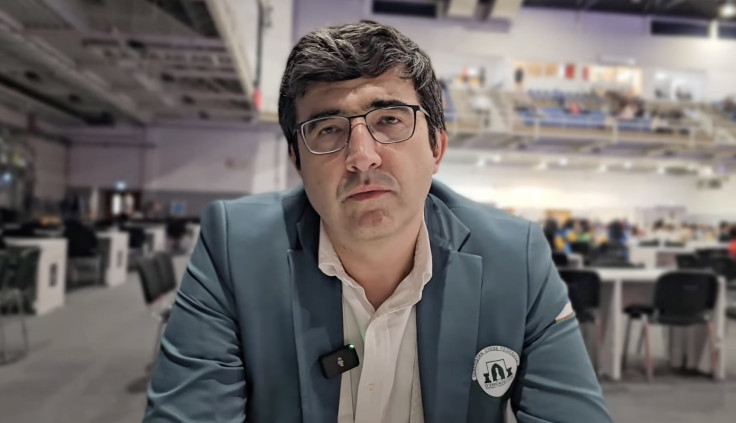'Sorry for Being Uncomfortable': Vladimir Kramnik Claims FIDE 'Ignored' Proof of Cheating for Over a Year
Kramnik maintains he has compelling evidence and is 'telling the truth,' a claim FIDE disputes.

In a bombshell claim that has rocked the foundations of professional chess, Grandmaster Vladimir Kramnik has accused the International Chess Federation (FIDE) of a shocking cover-up.
The former World Champion alleges that FIDE deliberately ignored concrete evidence of widespread cheating for more than a year.
Kramnik's Counter-Allegations: Claims of Ignored Evidence
Writing on X (previously Twitter), Vladimir Kramnik asserted that his offer to FIDE — made in a formal letter a year ago — to 'present my findings' was ignored.
He further remarked that the organisation responded two hours after receiving the email, which was sent by a FIDE lawyer (about a month ago); no response has been received from FIDE since. 'Sorry for being uncomfortable again, by telling truth.'
Answered two hours after the email from, for some reason, from FIDE lawyer (about a month ago),no response received from FIDE since.
— Vladimir Kramnik (@VBkramnik) November 2, 2025
On top offered myself a year ago in formal letter to FIDE to present my findings, ignored
Sorry for being uncomfortable again, by telling truth pic.twitter.com/ydlmj0qXdL
The X post suggests that the communication sent to the FIDE solicitor received no proper reply, despite his long-standing offer. Kramnik alleges that he compiled several types of data from online games — statistical, analytical, and behavioural — which, he suggests, indicate cheating by specific individuals. He formally requested that FIDE investigate these findings.
Kramnik maintains that the organisation failed to take action. During an interview reported by The Indian Express, he claimed: 'I never accused Daniel of cheating ... What I did, I collected very, very serious material and I will stand by it and prove it in any commission or whatever is needed.'
"I never accused Naroditsky of cheating" - Vladimir Kramnik pic.twitter.com/sHTA5e7wqQ
— ChaeDoc (@ChaeDoc) October 29, 2025
Kramnik reiterated that his concerns were not 'baseless accusations' but instead, a 'very, very argumentised suspicion.'
The FIDE Response
Arkady Dvorkovich, FIDE's president, acknowledged Kramnik had shared some data but stated that the organisation 'didn't receive it from him' in the required format. According to a separate report by The Indian Express (screenshots of which Kramnik subsequently shared on his X post), Dvorkovich specified that the data was required with full methodology and scientific foundation.
Dvorkovich said, 'I tried to persuade Vladimir Kramnik informally that he should be less aggressive... I also asked him to provide the full methodology — a clear scientific foundation for the statistics — that he is using to air his hints or accusations. And we didn't receive it from him.'
The Wider Context and Fallout
The emergence of Kramnik's claims comes against the sombre backdrop of the death of US grandmaster Daniel Naroditsky, who had been the repeated subject of the former world champion's public suspicions regarding online cheating.
This was during Daniel Naroditsky’s last stream. My heart aches to see him gone in this state. I didn’t want to upload this at first because I believe he should be remembered by the person he was, but people should watch the harsh truth of what was done to him, never forget. pic.twitter.com/4bVqsmve6a
— Tomi Luraschi (@TomiSwegg) October 21, 2025
Within the chess community, a chorus of critics condemned Kramnik's conduct as profoundly harmful. Notably, Indian Grandmaster Nihal Sarin — writing in a self-authored piece for The Indian Express — stated the consequences were extreme, declaring, 'He (Kramnik) has kind of literally taken a life.'
In a corresponding official move, FIDE formally submitted all public commentary made by Kramnik— encompassing remarks both preceding and following Naroditsky's passing — to its Ethics and Disciplinary Commission for review, as reported by Reuters.
Kramnik's Defence and Counter-Actions
In his defence, Kramnik has been unwavering, asserting that his only fault is in being 'uncomfortable' and telling the truth regarding what he views as cheating issues in chess.
He has repeatedly stated his commitment to the facts, insisting he remains ready to present his evidence and methodology to 'any commission or whatever is needed,' including the FIDE Ethics and Disciplinary Commission.
Kramnik's defence extends beyond a denial of personal wrongdoing to a fundamental critique of the governing body of chess, FIDE, which he claims forced his public actions.
He claims that his decision to be more forthright and public with his concerns was a direct consequence of FIDE's silence and inaction on the issue of online cheating.
Why This Matters: The Fair Play Gap
Cheating in online chess is a rapidly growing concern that presents a fundamental threat to the game's integrity. As pointed out by The Indian Express, while over-the-board cheating is rare, the online environment introduces a new vulnerability where official detection and disciplinary mechanisms, particularly those of FIDE, lag dangerously behind.
When a high-profile former world champion directly claims that those anti-cheating mechanisms are ineffective — or deliberately overlooked in cases he presented — it raises serious and urgent questions about FIDE's governance, accountability, and its role in protecting player reputations.
Kramnik's core argument is that his evidence of significant wrongdoing was ignored, and any institutional follow-through or independent investigation did not match FIDE's request for a stronger methodology. This perceived inaction is highly detrimental to the organisation's credibility.
The Next Phase: FIDE Investigation and Legal Signals
The next decisive move belongs to the FIDE Ethics and Disciplinary Commission, which will determine if Kramnik's actions or FIDE's handling of the situation warrant sanction or organisational reform. Separately, Kramnik has signalled his legal intentions, telling the media he possesses 'a lot of documents, facts' and is ready to 'meet in court.'
For the global chess community, this controversy transcends a personal feud. It represents a fundamental challenge: an open-book test on how it upholds integrity and manages suspicion, the burden of proof, and the rights of both accusers and the accused in the digital age.
© Copyright IBTimes 2025. All rights reserved.






















